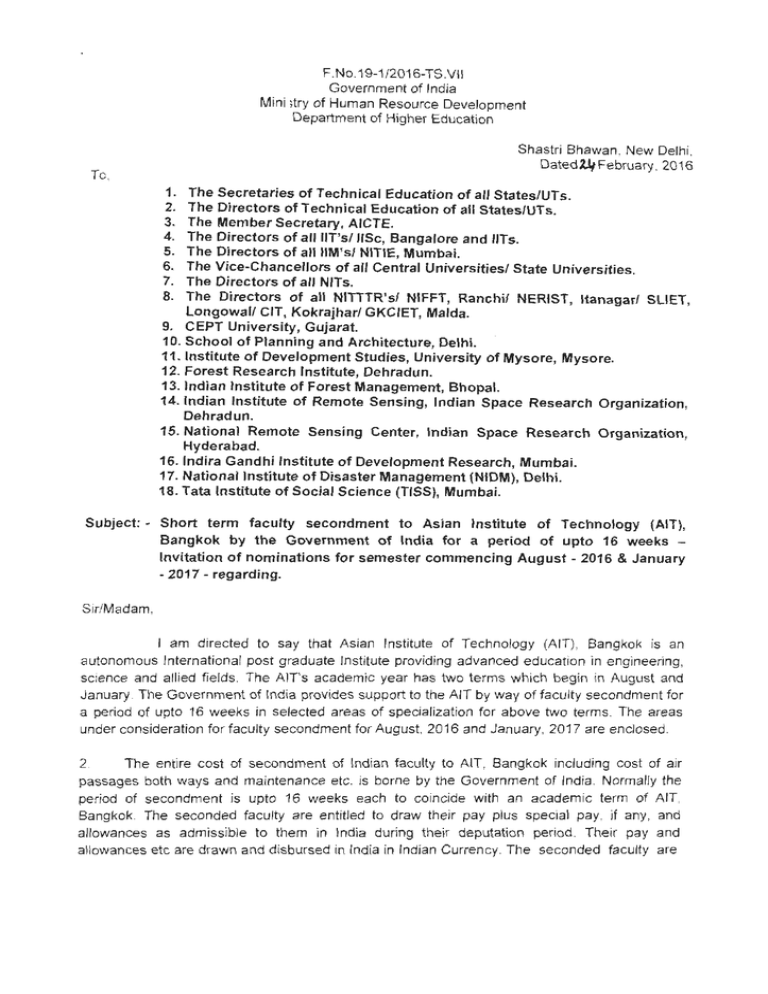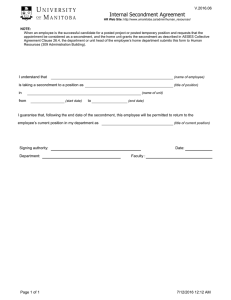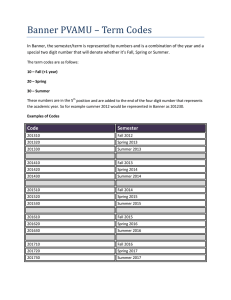Short term faculty secondment to Asian Institute of Technology (AIT)
advertisement

F.No.19-1/2016-TS.VII Government of India Mini ;try of Human Resource Development Department of Higher Education Shastri Bhawan, New Delhi, Dated .ty February , 2016 To, 1. 2. 3. 4. 5. 6. 7. 8. The Secretaries of Technical Education of all States/UTs . The Directors of Technical Education of all States/ UTs. The Member Secretary, AICTE . The Directors of all IIT's/IISc, Bangalore and IITs. The Directors of all liM's! NITIE, Mumbai. The Vice-Chancellors of all Central Universities/ State Universities. The Directors of all NITs. The Directors of all NITTTR's/ NIFFT, Ranchi/ NERIST, ltanag ar/ SUET, Longowal/ CIT, Kokrajhar/ GKCIET, Maid a. 9. CEPT University, Gujarat. 10. School of Planning and Architecture, Del hi. 11 . Institute of Development Studies, University of Mysore, Mysore. 12. Forest Research Institute, Dehradun. 13. Indian Institute of Forest Management, Bhopal. 14. Indian Institute of Remote Sens ing, Indian Space Research Organ ization , Dehradun. 15. National Remote Sensing Center, Indian Space Resea rch Organ ization, Hyderabad. 16. Indira Gandhi Institute of Development Research , Mumbai. 17. National Institute of Disaster Management (NIDM ), Del hi. 18. Tata Institute of Social Science (TISS), Mumbai. Subject : - Short term faculty secondment to Asian Institute of Technology (AIT), Bangkok by the Government of India for a period of upto 16 w eeks Invitation of nomi nations for semester commencing August - 2016 & January - 2017 - regard ing. Sir/Madam, am directed to sa y that Asian Institute of Technology (AIT), Bangkok is an autonom ous International post graduate Institute providing advanced education in engineering, science and allied fields . The AIT's academ ic year has two terms which begin in August and January. The Government of India provides support to the AIT by way of fa culty secondment for a period of upto 16 weeks in selected areas of specialization for above two terms . The areas under consideration for faculty secondment for August, 2016 and January, 2017 are enclosed. 2. The entire cost of secondment of Indian faculty to AIT, Bang kok including cost of air passages both ways and maintenance etc. is borne by the Government of India. Normally the period of secondment is upto 16 weeks each to coincide with an academic term of AIT, Bangkok. The seconded faculty are entitled to draw their pay plus special pay, if any, and allowances as admissible to them in India during their deputation period. Their pay and allowances etc are drawn and disbursed in India in Indian Currency. The seconded fa culty are -2entitled to daily allowance in Bangkok as admissible vide Ministry of External Affairs orders in this regard issued from time to time. The exact amount of daily allowance in Bangkok depends on the rate determined by the Ministry of External Affairs for the particular period. Besides this, AIT also provides accommodation in the campus at subsidized rates subject to availability. The seconded faculty is entitled to travel by air by economy class in shortest route from the nearest port of embarkation in India to Bangkok and will also be entitled to excess baggage as per instructions issued by Government of India. The above-mentioned terms and conditions of secondment are tentative and subject to approval by the Ministry of Finance at the time of secondment. The salary in respect of faculty during the period of deputation will be met by their respective State Government/ Institution themselves. In addition, the leave salary, contribution of Provident Fund/General Provident Fund and Pension Contribution etc. in respect of the faculty deputed will be met by the respective State Govt./ Institution themselves. 3. You are requested to kindly give wide publicity of this scheme in your institution especially in the Departments covering the areas in which faculty secondment is being planned for the year 2016-2017. The nominee should have a doctorate degree in the relevant area, postgraduate teaching experience relevant to the cou rse description indicated against the area and substantial research publications in the area to his credit. Nominations may kindly be sent in respect of only those candidates , who could be spared , in the event of their selection, for undertaking the proposed assignment at AIT, Bangkok for a period upto 16 weeks for the terms as indicated against each course . Since it is the endeavour of the Government to send best faculty from India to project the right kind of images at the international level, you are requested to kindly forward only those nominations that would be meeting the above mentioned requirement. The Selection Committee gives its recommendations to the Government on the basis of the biodata of the nominees placed before it. Therefore, five copies of the bio-data of the faculty recommended for consideration of the Selection Committee may be sent to this Ministry in the enclosed format as per Annexure-1. The above details relating to short term faculty secondment to AIT, Bangkok may also be seen at M/oHRD website www.mhrd.gov.in 4. The last date for receipt of nomination in this Ministry is 15th April, 2016. The nominations are required in five copies duly screened and recommended by the Head of the Institution/ Competent State Govt. Authority and to be sent to the following address: Shri Achint Kumar Under Secretary(TS-VII) Department of Higher Education, Ministry of Human Resource Development Room No. 405-C Shastri Bhawan, New Delhi-11 0001 . Yours faithfully , ~,-~-p.....- Encl: as above (Achint Kumar) Under Secretary to the Govt. of India Tele: 011-23384582 b\/ ~ . \J Copy_!Q;_~MIS v ~Y Unit, Ministry of Human Resource Development with request to put up the above notice on MHRD website for wide publicity. t~ bll~.c.u_ . ' tit~ 5Lt' :±)_,1 , r~ y_, '"-l o:). , tb s NV'fr~ C..MtsCoPl ~~~'>..·~h 7.- AN NEXURE- 1 ~ BIO-DATA (To be submitted in 5 copies) I AREA OF ASSIGNMENT FOR WHICH NOMINATION SENT COURSE CODE COURSE TITLE APPLIED FOR SEMESTER 1. Name (Expanded initials) 2. Date and Pla ce of Birth 3. Nationality 4. Present Post held with complete address of the Institute. 5. Present Postal Address Tel. No. / Fax No/E-Mail/Mobile No. 6. Educational Qualifications (starts from latest) Degree/ Diploma 7. I Year Subjects Taken Name of University/ Institute Professional Experience (starts from latest) Address of the Office, Organization or Institution 8. Division/ Grade Post held I Duration From To Specific experience: P.G. Teachi ng/Research Industrial Details of Published work: Books, Articles, Monographs, Papers (If the Space below is insufficient please give full particulars on a separate sheet of paper) Contd ... -29. 10. Summa ry of recentjcurrent projects undertaken Current Interests and Assignments 11. (a) Visits abroad: Count ry Visited Duration of Visit From To Purpose of visit (b) Previo us assignment with AIT, if any: Term 12. 1 Any Course taught Seconded by Government of India or directly hired by AIT other relevant information: Signature of Applicant. 13. j Remarks of Head of th e Institutio n: Signature of the Head of the Institution with Office sea I. AJT SCHOOL REQUESTS FOR ll'lDIAN FACULTY SHORT-TERM SECONDMENTS For August 2016 and Janua~ 2017 semesters FOR AUGUST201 6 SE:MESTER I. School of Engineering and Technology (August 2016 Semester) Course Code, Title, Credits AT72.01 Deterministic Optimization Models, 3 (3-0) AT72.04 Engineering Economy,3(3 -0) AT73.02 Advanced Manufacturing Processes, 3 (3-0) AT73. I 7 Advanced Material Science for Design & Manufacturing 3 (3-0) AT81.02 Digital Integrated Circuit Design, 3 (2-3) AT81.05 Analog Integrated Circuit Design, 3 (2-3) AT76.14 Digital Photogrammetry, 2 (1-3) I I 1 AT77.05 Teletraffic Engineering, 3 (2.5-1. 5) AT77. 10 Cellular Network Planrung, 3 (2-3) ' AT77 .15 Satellite Communications, 3 (3-0) Course Description Deterministic optimization modeling, software packages, linear programming, integer programming and combinatorial optimization, dynamic programming, network flow, nonlinear programming. Basic concepts in engineering economy, economic evaluation of alternatives, replacement analysis, accounting concepts, depreciation and taxation, product costing and cost estimation, risk and uncertainty, deterministic capital budgeting models. Structural properties of engineering materials, subtractive manufacturing process, unconventional manufacturing processes, additive manufacturing processes, formative manufacturing processes, rapid prototyping systems, environmental aspects. Ferrous metals, non-ferrous metals, composite materials and processes, plastics, coatings, finishes and adhesives, testing of materials, deterioration of materials, economics of material selection, case studies of material selection. Digital systems design process and CAD tools, combinational and sequential circuits design and implementation, inpuU output design and clock generation, design of memory, hardware description language (HDL), rapid prototyping and implementation of digital systems, memory system design and test, testing and design for testability (DFT). IC technology, device modeling and layout, basic analog sub circuits, noise analysis and modeling, basic operational amplifier design, advanced operational amplifiers, comparators, integrated futers, data converters. Basic photograrnmetry concept, procedure, processing task and its result through project work, error analysis with various methods, softwares. Traffic flows in networks, classical loss systems, delay systems, traffic measurements, multi-dimensional traffic, laboratory sessions including traffic behavior and characterization, dimensioning of full availability loss systems, delay systems, limited availability, overflow systems and ATM traffic models. Radio network planning, cellular network planning approaches, propagation analysis and coverage planning, frequency allocation, cellular network planning tools and laboratory sessions including cellular network planning using NPS/X Tool and cellular Network Measurement with the NMS/X. Satellite communications, orbital aspects of earth satellites, satellite link design, propagation on satellite-earth paths and its Page I of 4 AT77.16 Digital Signal Processing, 3 (2-3) II. School of E nvironment, Resou rces and Development (August 2016 Semester) Cour se Code, Title, C r edits ED76.05 Integrated Land Use Management Systems, 3 (3-0) ED76. 14 Society and Natural Resource Management 3 (3-0) III. influence on link design, modulation, multiplexing and multiple access techniques in satellite communications, satellite networking, spacecraft and earth station technology, performance and reliability of satellite communications. Discrete-time signals and systems, frequency domain representation of discrete-time signals and systems, sampling of continuous-time signals, the z-transform, transform analysis of linear time invariant systems, the discrete Fourier transform, implementation of discrete-time systems, design of digital filters, digital signal processors, digital signal processing, applications in mobile and wireless communications and laboratory sessions. Cou r se Description Integrated analysis of land use management, properties of integrated land use systems, ILUS for sustainable development. Social and economic dimensions of natural resources management, paradigms and theoretical approaches to the management of common pool natural resources, issues related to the use of natural resources, natural resource management approaches, sustainabili1y of natural resource management. School of Management (August 2016 Semester) Course Code, Title, C redits SM60.22 Managerial Economics, 2 (2-0) Cou rse Descrip tion Theory of finns, business ethics, optimizing techniques, new management tools, demand analysis, demand estimation, production theory and estimation, cost theory estimation, market structure, perfect competition, monopoly, oligopoly, game theory, pricing regulation, risk analysis. SM80.16 Project Management, Project concepts and approaches, success criteria and factors, project design and appraisal, project organization and 3 (3-0) stakeholder management, risk analysis, scope definition and management, project planning and scheduling, monitoring and control methods, earned value project management, cost estimates, budgeting and financial control of projects, conflict resolution and team building, problem solving in project environment, project termination, application of computers in project management. Electronic commerce, mobile commerce, payment gateway, SM80.20 Managing and privacy, online security. Implementing Electronic and Mobile Commerce, 3 (3-0) Page 2 of 4 I FOR JANUARY 2017 SEMESTER IV. School of Engineering and Technology (January 2017 Semester) Course Title AT77.07 Cellular Mobile Systems, 3 (3-0) Course Description Background and history of cellular mobile radio, the mobile radio environment, diversity schemes and combining techniques, modulation techniques, receiver structures and equalizers, cochannel and adjacent channel interference, cellular traffic, mobile systems like multiple access techniques, coding for error detection and correction, second-generation digital wireless systems, performance analysis: admission control and handoffs, 2.5G/3G mobile wireless systems, 3.5G/4G mobile systems. AT77.09 Error Control Coding, Block codes and their implementation, perfom1ance of block 3 (3-0) codes, convolutional codes, trellis coded modulation, turbo and LDPC codes, space times codes, cooperative coding, networking coding. AT72.09 Inventory and Logistics Review of inventory system, traditional inventory models for Management, 3 (3-0) independent demand, dependent demand system- material requirements planning (MRP), advanced production/ inventory models, introduction to logistics and supply chain management, logistics and supply chain processes. AT81.11 Mixed Signal IC, 3 (2-3) Mixed Signal IC design, design of switched capacitor circuits, design of data converter circuits, design of phase locked loop and frequency synthesizers. AT76.15 Microwave Remote Fundamental knowledge and theories of m icrowave remote Sensing, 2 (2-0) sensing, interaction of electromagnetic radiation with matter, active and microwave remote sensing. V. School of E nvironment, Resources and Development (January 2017 Sem ester) Course Code, Title, C redits ED71.09 Coastal & Inland Fisheries Management, 2 (2-0) ED71.9018 Selected To_~:; ic: Health Management in Aquaculture, 2 ( 1-3) (for 50% teaching) ED76.13 Natural Resources Degradation and Conservation, 3 (3-0) ED79.14 Governance and Urban Managen1ent,3 (3-0) Course Description Basic stock assessment procedures, population dynanlics, fishery models, integrated approaches for fisheries management, ecosystem approach to fisheries management, community based fi shery management, sustainable management of inland and coastal fisheries of Asia. Fish Pathology, infectious diseases, epizootiology, diagnostic techniques, and therapeutics, immunology of finfish and shellfish, microbiological and biotechnological tools, aquatic pharmacology, advances in biosecurity and disease surveillance. Natural resources degradation, human impacts on natural resources (types, causes and impacts), soi l erosion, tools for natural resource degradation assessment and monitoring, degradation assessment method, conservation concepts and measures. Urban politics, governance theories, public management models, contextual and practical issues in urban Page 3 of 4 : ED79.04 Environmental Science and Technology for Decision Makers, 3 (3-0) -- - - - --- - -- - VI. management. Introduction to environmental science, engineering and technology, ecosystem and understanding of its carrying capacity, cycle of elements in environment, environmental protection vs. development, urban ecology, environmental resources and population growth, environmental effects and sustainable development, parameters used in environmental science, decision making on pollution, pollution standards, health effects, risk model and assessment and setting priority for action, effects of urban pollution (air, noise, odor, water, wastewater, land, solid waste and toxic waste), and treatment technologies, the roles of energy, transport, industry and the environment. School of Management (January 201 7 Semester) Course Code, Title, C r edits SM60.52 Marketing Management, 2 (2-0) SM 80.08 International Marketing and Export Management, 3 (3-0) SM80.29 International Economic, 3 (3-0) Course Description Marketing strategies and plans, product strategy, creating customer value, customer-relationship management, building brand equity, designing and managing services, pricing strategy, marketing channels, marketing communication. Exporting, globalization of markets, standardization vs. regional responsiveness, market entry strategies, global market research, global product policy, global pricing, global advertisement. Theory of international trade, law of comparative advantage, modem theory of international trade, offer curves, tariffs, other trade restrictions, economic integration, international trade and development, foreign exchange markets, balance of payments, price and income adjustment mechanism, adjustment poli~ies, international monetary s~stem. Page 4 of 4

